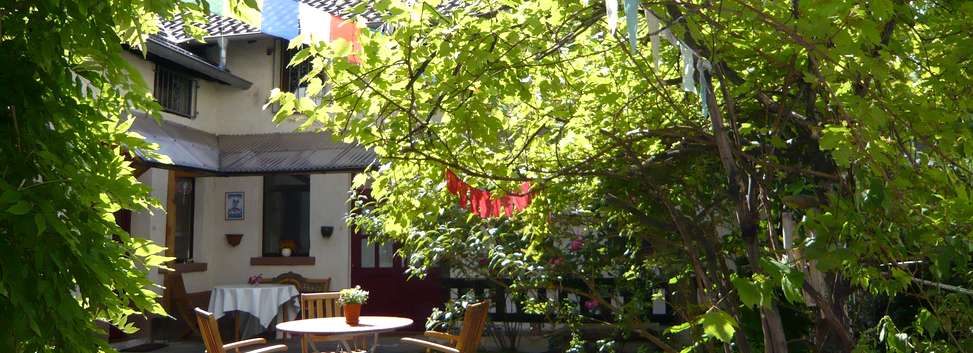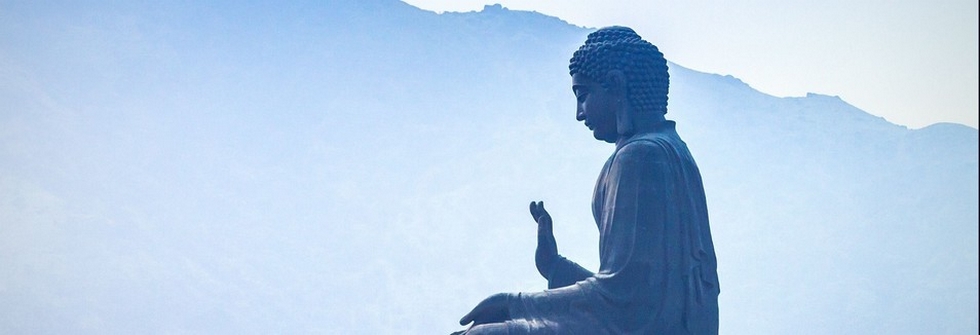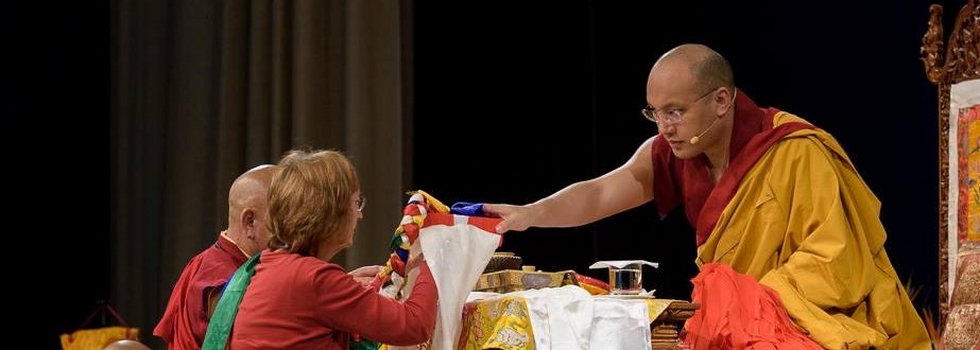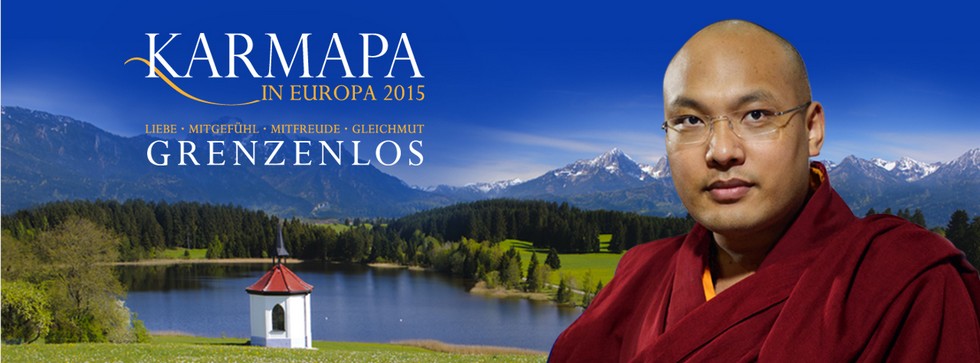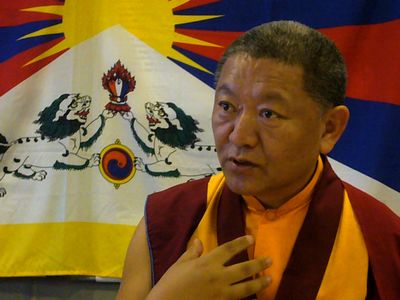
Venerable Ringu Tulku Rinpoche
Non-Violence & Peace
Presented on March 13, 2009 in the City Hall of Münster,
situated above the historical Friedensaal where the treaty that marked the end of the Thirty Years War,
among rivalling religious communities & institutions in Europe, was signed in 1648.
Hosted by the Advisory Council for Foreigners of the city of Münster,
in collaboration with the Sozialpädagogisches Bildungswerk & Karma Sherab Ling.
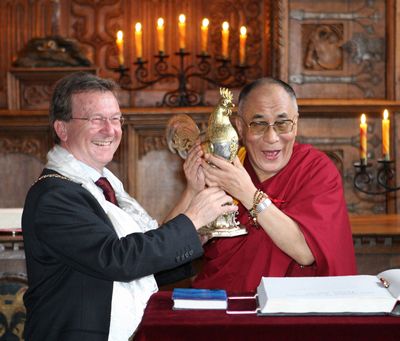
This article is humbly dedicated to
His Holiness the XIVth Dalai Lama, Tenzin Gyatso,
seen on the photo in the Friedensaal in Münster with the Lord Mayor Dr. Tillmann in 2007,
and to the preservation & propagation of the Buddhadharma.
Mr. Spyros Marinos, Chairman of the Advisory Council for Foreigners:"Ladies and gentlemen, I wish to greet Venerable Ringu Tulku Rinpoche in the name of the Advisory Council for Foreigners in Münster, the Sozialpädagogisches Bildungswerk, and Mr. Josef Kerklau who has wonderful connections to Tibetan masters and was thus able to organize this special event. I also wish to greet Prof. Jan Andersson and thank him for being here with us this evening. He organized the visit of His Holiness the XIVth Dalai Lama to Münster in 1998 and 2007. With sincere gratitude, we remember having been able to meet His Holiness personally on those occasions. In 2007, we were also able to organize a wonderful exhibition on Tibet in the Rathaus.
Before asking Ringu Tulku Rinpoche to speak about non-violence and peace in Buddhism, I wish to mention Mahatma Gandhi (1869-1948), Dr. Martin Luther King (1929-1968), and His Holiness the Dalai Lama as greatest representatives in our times of non-violence, the only reliable ethical way to fight for the welfare of suppressed people. Having been forced to flee the destruction of his homeland, His Holiness the Dalai Lama and many Tibetans arrived in exile on March 17, exactly fifty years ago. They are living representatives of ahimsa, ´non-violence.' We feel especially honoured that Ringu Tulku is visiting with us while people worldwide are recalling those events.
Venerable Ringu Tulku was born in Kham, East Tibet, in 1952. He and his family escaped the communist siege of Tibet in 1957 and arrived in India in 1959. He has been living in Sikkim ever since then. Recognized as the reincarnation of the abbot of Rigul Monastery in East Tibet, from earliest childhood he received the traditional training of a Tulku, was instructed in all schools of Tibetan Buddhism, and then served for 17 years as professor at the Namgyal Institute of Tibetology in Gangtok, Sikkim, and at the Sampurnananda Sanskrit University in Varanasi, India. He is one of the main representatives of Rime, ´the non-sectarian tradition of Buddhism.' He travels to teach Buddhist philosophy and practices to students around the world and spends a few months in Europe every year. He is very keen on contributing to inter-religious dialogues for the sake of understanding, respecting, and living in peace and harmony with each other and is an honoured speaker at these conferences worldwide. This afternoon, Ringu Tulku Rinpoche took part in the Universal Peace Ceremony for all Nations that was held at the Dominican Church and was organized by Mrs. Anna Maria Ittermann, who I wish to greet here, too. I want to close my introductory speech by reading the prayer that he composed and recited in the church today. It is:
"Ipray to all those who are blessed with compassion and wisdom,
I pray to all those who have the power to dispel from our minds
The darkness of ignorance.
In this world of ours,
That is filled with hatred and misguided faith,greed, distrust, and arrogance,
Which generate bloodshed, fanatism,exploitation, disharmony, and suppression,
May there be a spark of understanding.
May we be able to have the wisdom
To act unto others what we wish others to act on us.
I pray from my heart, deep and fervent.
Let us all pray together in harmony.
If we all did this together in earnest
The world I am sure will change
And become a harmonious place to live."
Venerable Ringu Tulku
Thank you very, very much. I feel deeply honoured for having been given this opportunity to speak to you about peace and non-violence in the same hall where the peace treaty was signed many years ago.
It was very moving for me to experience the prayer meeting that was held this afternoon in memory of the Tibetan uprising fifty years ago. As you know, I witnessed what happened in Tibet at that time. The revolts and protests that took place in Tibet were not ideological or political and had nothing to do with resisting economic reforms. Actually, the Tibetan people, especially those living in remote areas, had no political ideologies. They revolted because they could not accept living without freedom of expression, without freedom of their own lifestyle, and without freedom to just be. They wanted to live peacefully. They had adopted a lifestyle in which they wanted to live without interference from other people and without interfering in the affairs of others. When they realized that they were being robbed of their freedom, many individuals revolted because they could not tolerate being oppressed. The uprisings were not organized by a governmental or religious institution. Every one had to face the consequences that there was no hope or way of winning, so they were willing to die in the process. Actually, even now Tibetans have the same spirit as they had then when they protest. They don't have false hopes that somebody will listen or help them, but they protest because they think that it is better to die than to live the way they are forced to live.
When I was less than five years old, my uncle started the revolt in my area. The Chinese communist officers called on him and told him to attend a meeting they were having in the king's palace of our small kingdom. He told them, "I'm not coming to the meeting. After you have some tea, please go away as my friends. If you come back tomorrow, I will greet you with my guns." He wasn't that peaceful, actually. Every one who attended that meeting was imprisoned. My uncle and a few of his friends organized a local army, because there was no army and no police in Tibet. People had guns, though, especially the warrior-type inhabitants of Kham. They attacked the palace and freed the prisoners. Of course, the army came from everywhere. They fought a few battles. The Tibetans won one battle and lost after more Chinese came, so we had to flee.
We usually travelled at night and hid in the forests and mountains during the day while escaping. At the beginning of our exodus, I rode on a small horse. In that part of the world, people ride horses when they have grown a little. The small horse had a saddle and they tied me up with a rope that was twisted around the posts at the four sides of the saddle so that I would not fall off when I fell asleep. We travelled day and night and sometimes had to cross rivers with strong currents. One of the legs of my horse got injured when we crossed a river one night. After that, I was put in a box that they made out of yak hide and placed on the back of a mule. So, that's how I travelled, loaded on a mule, until we arrived at the border of India. On the way, we were attacked many times by the army following us from behind. Our group consisted of about 1000 people. Sometimes people were killed, sometimes people scattered, and sometimes people got caught. Sometimes people went their own ways and slowly came together again, forming the group again, one-by-one. So, that is how we travelled. When we arrived in India, only 150 people were left in our group. I don't know how many refugees then died in India. It was so difficult for us. We didn't know how to cook Indian food, how to wear Indian clothes, how to live the Indian way. There were leeches everywhere. We didn't know how to deal with mosquitoes. Somebody died almost every day.
While all this was happening, many journalists and people from all over the world came and saw that the Tibetans had gone through so very much and had endured so many hardships. Many of my people were extremely traumatized, because there wasn't one person who hadn't lost somebody. I came from a big family. My parents, for instance, had 3 daughters and 9 sons and my father and all sons except me were killed. In my monastery alone, 40 monks had committed suicide, because they couldn't tolerate being punished for being monks. The Chinese stabbed a wooden peg in the ear of one monk from my monastery; it was such a terrible struggle for him when they got him the next time that he jumped into the river and died. It was like that. Of course, Tibetans are like other people. They didn't like the situation and hated the Chinese, especially those who were behind all these actions.
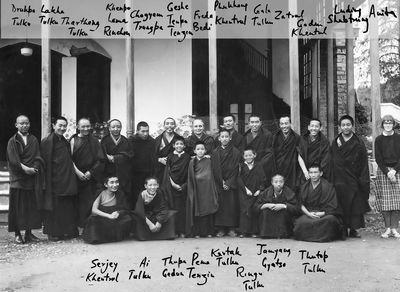
The Indians, journalists, and other people who saw us when we arrived in India discovered that, although they had gone through so many troubles, the Tibetans hadn't lost their good spirits, that they could still laugh and could still enjoy life. It was very hot in India in the summer, and there were so many mosquitoes that it was impossible to sleep in the camp where we stayed. So we sang and danced all night. The people who saw us thought, "These are really strange people." I think many people started becoming interested in Tibetan refugees at that time, because they found that the Tibetans have a different way of looking at life. Although it is true that not all Tibetans have a proper Buddhist training, nevertheless they believe in Buddhism and have the culture. They understand that it's not the end if things are bad in this life and that there are many more chances. They know that every up has a down and every down has an up. They know that if nothing can happen in this life, there is a next life. Therefore, Tibetans aren't totally devastated if everything goes wrong. I found that was a strong trait that the Tibetan people could keep - a certain sense of serenity in very difficult situations.
I was not a very peaceful person. I was very hot-tempered and proud when I was a child. I used to get angry so often. Then I saw everything in red and attacked my opponent, even those who had twice a bigger voice than I did. I had a technique to go at them with my head and beat them with my hands, feet, and knees and then bite. I couldn't feel anything when I was very angry. I think this has a little bit to do with my up-bringing in Kham, the eastern part of Tibet where I come from. The most important quality a person, especially a boy is said to have there is bravery. One could be very intelligent and good in other things, but one is nobody if one isn't brave. It was considered so important to be brave. Sometimes the first meat that parents gave their child to eat was the heart of a wild animal, hoping their child would become like a wild animal. I was given a piece of that. But, I must report that it didn't work with me. I'm not that brave.
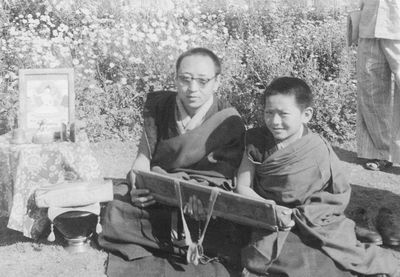
I think I changed at around the age of 9 or 10, when I started to study Buddhist texts, especially the ancient text that was composed by the great Indian scholar Shantideva, entitled Bodhicharyavatara – Entering the Way of the Bodhisattva. This book is about trying to think properly, about the usual way one sees other people, how one usually sees oneself, how one usually reacts with one's negative emotions like anger, jealousy, and so forth. One learns to ask, "Is it a good way, a practical way, a beneficial way to react or not?" This book presents the internal dialogue that teaches one to investigate one's own experience of what is really right or wrong, what is really good or not. This book taught me to clearly see that every living being wants to be free of suffering, pain, and problems and wants to be happy and joyful; and that everybody is going about trying to get that. If somebody attacks another person, it's due to the intention of wanting something good. People have the same motivation when they do something good, and therefore we are all the same. We are running after our own good all the time and try to run away from problems, negative things, and suffering all the time. And that's why we are busy. Whether we succeed or not is another matter.
Being able to see everyone else more or less like one sees oneself, one feels other people's problems and situations and kind of learns how to put oneself in their shoes. I found that this is very important, because when one puts oneself in other people's shoes, when one knows what kind of situations they are going through, or sees why they are the way they are, or why they are reacting the way they do, then one can understand them more clearly. One becomes much more sympathetic with others' way of reacting when one understands them more clearly. I thought it was very important in my life to understand this, to actually find a way to put myself in somebody else's situation, and to discover why that person reacts the way he or she does. Most of the time one only reacts to people and situations from one's own vantage point, wondering, for example, "Why is that person saying those things to me?" I found it was very important to feel for others.
Another point that was very important for me while studying was learning that having a negative emotion like hatred, for instance, is not only bad for those one hates but is worse for oneself. Trying to be more compassionate, more non-violent, and more peaceful is more beneficial for oneself than it is for others. By being more bound to anger and hatred, the person who suffers the most is oneself. One continues experiencing one's injury by holding on to an emotion like hatred. And one doesn't want that, but one wants to be free of that. Actually, one hates somebody because one doesn't want that. Because one doesn't want to get hurt and therefore hates it, one kicks the injury and hurts oneself more and hurts others too, if one can. Of course, there are many other ways, but I think that this way of looking at situations and one's emotions gives very deep insight into what one really wants to develop, what is most important. After I discovered this for myself, my parents said that I changed. I think I did. I still got angry when I saw things slightly differently, but not as much. I could find a way to deal with my anger.
I also found that hating people who do bad things isn't a solution and doesn't work. Just punishing people for doing something bad is not a solution. The solution is to stop atrocities from happening. Therefore, it's not a matter of an eye for an eye, a tooth for a tooth, or a hand for a hand, but the solution is to transform and change one's hatred into love and friendship, to create situations in which the trouble of hatred, violence, and atrocities slowly come to an end. Of course, it's not an easy task. I think that it's very important to understand that it's not an easy task and isn't easy to do, because we are very emotional and react due to our habitual tendencies. Whether it is good or not is another matter. Wars and conflicts can never be stopped but will continue going on as long as people resort to violence and hatred. Somebody has to stop violence and hatred from being born. The person who understands and decides, "I'm not going to hit back at this point," stops the process from evolving. Someone who has that courage, that resiliency, that strength is the most powerful person. Therefore people who act with non-violence and compassion start seeing others with much more reverence and with much more respect.
That's why I studied Mahatma Gandhi, became a fan, and read many of his books, which also helped improve my English. He wrote very short sentences. His writings are like vitamins. While I was studying English, I was told that I must read the Bible if I really wanted to learn English. I had the Bible and thought it was very good for many things, not only for my English. But, Gandhi's sentences are short and good, and I was very inspired. His books also got me a job. It's not necessary to tell this, but: At the time of the Gandhi Centenary, maybe it was celebrated in the 60s, there was a poetry contest in every language. I was studying poetry in the Tibetan language then and my cousin said to me, "You must write something." I told him, "No, no. I'm always lazy. I will never get the prize anyway, even if I was born in a sacred place. Forget about it. I will never get it anyway." He insisted. Usually, I only work under pressure and then can work quite well. My cousin knew this, pushed me, so I wrote a poem. He submitted my poem and I got the first prize. I won 1,000 Rupees, which was only about 20$, but it was a lot of money at that time. Due to having won the prize, publishers thought I was well-educated, searched for me, and offered me the job as a Tibetan expert on writing children's text books. That's another story.
In any case, I found out early in life that not everything can always go well. There are many nice people and there are many people who aren't nice, to say the least, and who do lots of bad things. There can be problems in life and many things can go wrong. Making oneself unhappy, disturbed, angry, sad, fearful solves no problem. Whatever may be in the world and in life, one needs to remain certain of peace, and that's the best solution. Therefore, one's understanding, one's attitude, is explained in one stanza in The Bodhicharyavatara. Shantideva wrote that if it's possible to change something, then there's nothing to worry about, to be angry about, or to be upset about. Furthermore, if one cannot change something, there's no use being worried, angry, or upset about it. This stanza made a strong impression on me and on many people. Even His Holiness the Dalai Lama studied The Bodhicharyavatara many times and tells us that it really helped him.
I don't think that it's right for us to expect that everything goes well for us all the time. Problems arise for everyone. When that happens, one should think, "What can I do?" One needs to see if there is anything one can do to change the situation for oneself and others. Maybe one can do something, maybe one can't. Maybe it will take a long time, but maybe one can do something to stop the process from evolving. When problems arise, one should resolve and say to oneself:
"I must do it. I must act. I must make efforts. If my endeavours take a long time and don't help immediately, it's not helpful for me to be upset, to give up, and to be angry. Therefore I say to myself: Let it be.
I have to face whatever I have to face. Whether I like something or not, it's better to face it nicely. I have to go through whatever I go through and I'll do my best to go through the best way. But, I can only do my best. There's no use being upset about experiences. When I have this understanding and attitude, I don't have to feel too bad, be upset, or be disturbed. I will just do my best, no matter what happens."
Trying one's best leads to success. This understanding and attitude make one feel very good. One's life will be very happy and one will feel less stress. It's very nice when things go well. If things don't go well, it's nice until they do. I think that if one sees things in this light, one's mind will become more stable and thus one will find more peace within oneself. Of course, meditation helps, but I think that our attitude and understanding of our busy way of looking at life are very, very decisive.
Question:"Deep within myself I have general anger that I can recognize and control. But there's still a little bit of anger that I can observe without being able to affect it. It's kind of frightening for me. Do you have any suggestions how to dissolve that?"
Ringu Tulku: I think it takes a very, very long time. I don't think it's easy to completely dissolve one's negative emotions like anger. According to Buddhism, it's very important to understand that we have mind poisons, i.e., disturbing emotions, like ignorance, aversion, anger, miserliness, selfishness, greed, attachment. Their seed doesn't disappear until one becomes totally free of ignorance. According to Buddhism, this seed is with us until we become enlightened. It's not good to expect it to go away quickly. Usually, we speak about three main negative emotions. The first is the seed of the presence of a disturbed mind that makes an emotion start again when an incident occurs. The second seed is an object that causes a negative emotion to arise, an incident, like somebody being nasty. When subject and object come together, one's wrong way of reacting, like anger, arises. For example, if somebody does something that is really bad, one becomes angry and shouts. Getting rid of the seed is very difficult and eliminating the situations and things that make one angry is also very difficult; one cannot change everything in the world. By snapping one's fingers, negative situations will not vanish. One can do something about the way one reacts, though, so that's what one needs to work on. Trying to react to situations in a way that is good for everyone is the right way and doesn't cause too many problems for oneself and others. I think that it's like this many times and is the reason why things happen the way they do. If one can go a little bit beyond one's way of seeing things, one can find something good in a bad situation - sometimes. And that is your skill: how you face challenges. Sometimes things seem to be very negative and bad. Using those situations by letting go and by going beyond them, one can find something good in all situations and things; one can turn everything into a stepping-stone. But, I think one has to see how one reacts and try to work on that a little bit. I think one most important factor is acknowledging that one cannot expect to be perfect for quite a long time, and that's sometimes the problem. Sometimes students tell me, "I've meditated for three years and nothing great has happened. Why didn't you say so? What is this?" I tell them, "I'm fifty-…" I don't want to say how old I am. Speakers who introduce me always mention the year of my birth. Anyway, I've been living 56 years, almost 57, have meditated a little bit, not so much because I'm very lazy. One can progress slowly and if it doesn't happen in this life, it's okay. There's a next, a next, and a next. Maybe I'll be okay in a hundred lifetimes. So, what's the hurry?
Next question: /Mostly inaudible./ "My question has to do with how complicating it is to free Tibetans from Chinese imprisonment and if it is possible, the Chinese are still threatening."
Ringu Tulku: His Holiness the Dalai Lama is not asking for independence. He is asking that the Tibetan people can be freer under Chinese sovereignty. He says that he likes living together with others. The Chinese don't accept this and claim that he says he does not want independence but actually wants it. In a way, they know that Tibet is a different country, but it's an identity problem. His Holiness the Dalai Lama is asking that Tibetans be allowed to maintain their identity. For instance, Europe consists of many different countries that have lifted their borders and are united into a peaceful and nice nation, while every country has its own language and culture. It's not necessary to keep the countries divided. I think it's just a matter of time, of open-mindedness and concern for the welfare of the people. I don't think that settling the Tibet issue should be that difficult. It wouldn't be difficult or harmful for the Chinese if they gave the Tibetans what they want. The Chinese wouldn't lose anything. The Tibetans just want to live peacefully and maintain their own religion and culture that is good for themselves and also good for others. They don't want violence but want to live peacefully and care for their land. I don't see that Tibetans have too much hatred against the Chinese people. So far, I think it must be because of the continuous effort of His Holiness the Dalai Lama and many great masters who teach people that it's not good to hate anybody, including the Chinese.
When I went to China, I didn't see that much hatred between Tibetans and the Chinese people. Chinese are very nice and generous people. Actually, there are many Buddhists and there is a great exchange taking place on a cultural level. I was very surprised when I was in Chengdu. I found so many Lamas there and asked, "What are all these Lamas doing here?" I was told, "You are here in the summer. There are three times as many Lamas here in the winter." I asked, "Why are they here?" They said, "Oh, the Chinese people invite them to teach, to say prayers, and things like that." So, even when I was in Chengdu for only two days, I was invited for two lunches by Chinese people. So, the Chinese people have great respect for Tibetan Buddhists. Therefore I think that there's no real problem.
I think the fact that Tibetan Lamas are teaching the Chinese people makes the government insecure. There are many Chinese Buddhists who have lots of respect for His Holiness the Dalai Lama and especially for His Holiness the Karmapa. The XVIIth Gyalwa Karmapa speaks fluent Chinese and teaches in Chinese. His videos are everywhere. I think the government is a little bit afraid that too many Chinese will back the Tibetan teachings. Sometimes I feel that is why they try to attack the Dalai Lama so much. They feel a little bit insecure. It could be very difficult if they don't want it. China is now one of the strongest nations in the whole world. Nobody may say anything. They always interfere with everybody else's affairs but don't want anybody else interfering with their affairs. They are very angry when it comes to the Dalai Lama, are very powerful, economically and militarily, and they don't want to hear anything resentful. But, there are many possibilities for them because there is nothing China can lose. I hope it will happen and it is starting to happen very easily. It's just a matter of a very few people on top having the right motivation and making the right decision.
Thank you very much.
Josef:"I would like to thank SOBI, the Sozialpädagogisches Bildungswerk,for having helped organize this event. Ringu Tulku visits SOBI every year since 2001 and he is already known to belong to this house. In the name of Ringu Tulku, too, we also want to extend our sincerest thanks to Spyros Marinos for having helped organize this event and for having enabled us to use the rooms. Actually, the Advisory Council for Foreigners sponsored this event, seeing the entre fees were too low to cover the expenses. Special great thanks to Annette Bungers for her brilliant translation into German. She came to Münster extra to help us.
Annette:"I will be very, very happy to return."
Josef:"Presently, we only have a few translators in Germany who can do such a wonderful job and who can translate with such ease. Therefore, thank you very, very much, Annette. And of course, exceptional thanks to Rinpoche for returning to Münster every year since 2001. He is invited to speak all over the world, is in charge of many projects, writes books, sits at his computer and writes essays, entitled Lazy Lama Looks at Buddhist Meditation, Lazy Lama Looks at Refuge, and Lazy Lama Looks at Bodhicitta, and so on. So we know that he is very diligent. Even though he is responsible for a huge project in 2010, we truly hope he returns to us next year. Tug-je-che, Rinpoche.
Dedication
Through this goodness may omniscience be attained
and thereby may every enemy (mental defilement) be overcome.
May beings be liberated from the ocean of samsara
that is troubled by waves of birth, old age, sickness, and death.
By this virtue may I quickly attain the state of Guru Buddha and then
lead every being without exception to that very state!
May precious and supreme bodhicitta that has not been generated now be so,
and may precious bodhicitta that has already been never decline, but continuously increase!

Long Life Prayer for Ringu Tulku,
composed by H.H. the XVIIth Gyalwa Karmapa, Ogyen Trinley Dorje
The most peaceful essence of clear light, arisen as the changeless form of illusion,
free from any sign of age and decay, may he live forever as the Buddha of long life.
Sincere gratitude to the Advisory Council for Foreigners for having hosted & sponsored this special event so very generously. A very special "thank you" to Mara Stockmann, Director of the Sozialpädagogisches Bildungswerk in Münster, for her very cordial support. Special thanks to Wolfgang Werminghausen for having made the recording available to us. A very special "thank you" to Annette Bungers for her very excellent simultaneous translation of English into German. Very many thanks to Oliver Werner, photographer for the Westfälische Nachrichten, for the photo with His Holiness the Dalai Lama. A heart-felt "thank you" to Josef Kerklau for having organized this event, for the photo of Ringu Tulku on top & for having helped with this article so immensely. And wonderful thanks to Ringu Tulku for the photos from his family album. Transcribed & arranged by Gaby Hollmann, solely responsible for all mistakes. Copyright Ven. Ringu Tulku & the mentioned beneficiaries in Münster, 2009. All rights reserved
May the truth of the Buddhadharma spread throughout the world and
bring peace & happiness to all living beings!






